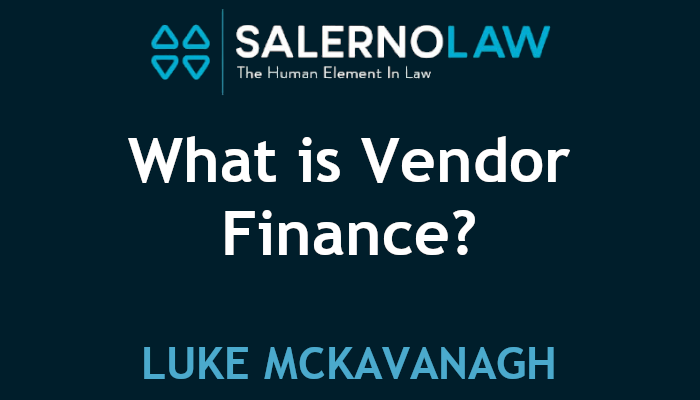Vendor finance is a form of lending where the seller lends the buyer money to help pay for what is being sold.
A common example is using vendor finance when selling a property or business. Instead of the buyer paying the full purchase price to the seller at settlement, the buyer will pay-off part or all of the purchase price in instalments over time. The sale of the property or business will still ‘settle’ and ownership will generally change hands, but the seller won’t receive payment in full until a future time.
Vendor finance can therefore be an attractive option for a buyer who is unable to obtain finance for a transaction through a traditional lender such as a bank. It can also be attractive to a seller wanting to get a certain price and interest.
This arrangement is commonly used in situations where there is an existing relationship (and an element of trust) between the buyer and seller. An example is a sale between family members, or an employer selling a business to their employee.
Documenting Vendor Finance
The most common risk carried by vendor finance is the buyer being unable to repay the debt. A vendor finance arrangement should therefore always be properly documented in order to protect the interests of both the seller and buyer.
Vendor finance is generally documented within a Loan Agreement. This is entered into in conjunction with a Sale Contract for the transaction being secured (or it can be documented by terms within the Sale Contract itself).
The documents will specify the amount of the loan, a payment plan with the dates and terms for repayment, how long the loan will be for and whether interest is payable. There may also be the requirement for the buyer/borrower to provide regular financial reports to the seller/lender.
Importantly, the documents will set out what happens if the buyer/borrower defaults in making payment. This can be the payment of interest on outstanding money at a higher interest rate, the right for the seller/lender to immediately demand full payment of the outstanding balance of the loan or even the right for the seller/lender to take-back an asset (for example, stepping in and taking back the business).
The documents (generally the Loan Agreement) will often set out the different ways in which the loan is further secured. Security may include the following:
- Personal guarantees will give the seller/lender the right of recourse against the guarantors if there is a default. If the buyer/borrower is a company, then the guarantors will generally be the company’s directors and shareholders. The seller/lender will have the right to demand payment from the guarantors in addition to or instead of the buyer/borrower.
- There will generally be a charging clause securing repayment of the loan against the assets of the buyer/borrower and any personal guarantors. This will usually be the right for the seller/lender to register a security interest on the Personal Properties Securities Register (PPSR). A separate General Security Agreement is often entered into alongside the Loan Agreement. Upon default, the seller/lender will be entitled to appoint a receiver to a buyer/borrower who is a company. A receiver can then run a company to try to maximise its assets, as well as collect/sell the charged assets to satisfy the debt. Ultimately, a receiver may sell off particular assets of the company or the entire business.
- If the buyer/borrower and/or the guarantors own property, then a mortgage will allow the seller/lender to sell that property on default by the buyer/borrower. The more equity in the property, the more secure the mortgage will be.
- In order to put the seller/lender in front of other third-party lenders and secured creditors, a Deed of Priority can be entered into.
Takeaways
You should only enter into a vendor finance arrangement after speaking with your lawyer and accountant about whether it is appropriate, viable and legally sound.
From a seller’s point of view, there needs to be sufficient security if the buyer doesn’t pay the debt owed. If the asset is a business, then sellers face the risk that the value of any assets secured by the loan may depreciate if the buyer doesn’t run the business effectively.
From a buyer’s point of view, the security a seller takes out must be reasonable, together with the circumstances which entitle the seller to have recourse to that security.
The team at Salerno Law are experienced in acting for both sellers and buyers in all aspects of vendor finance. This includes drafting, reviewing and/or negotiating the appropriate documents.
We are here to help. Speak to us today.
Luke is part of Salerno Law’s commercial and business law team. His days involve providing advice on a wide variety of commercial issues that arise in operating small to medium businesses, where he assists clients who are growing their business or wanting to protect what they’ve established.
DISCLAIMER: This article is only meant to give you general information and should not be relied on as legal advice. Speak to one of our lawyers for more information.




Leave A Comment